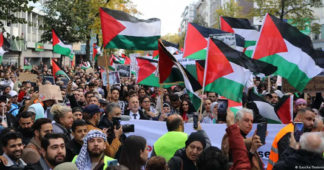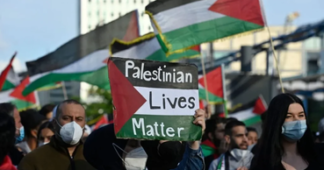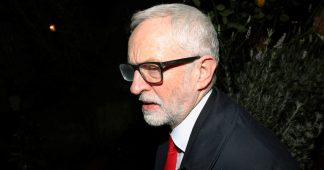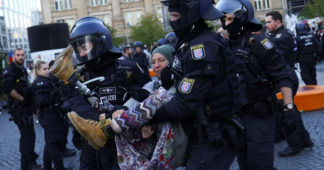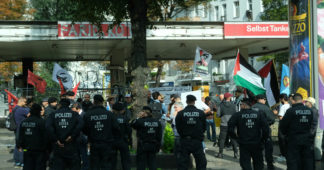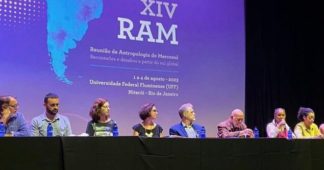Author Annie Ernaux, Palestinian poet and activist Mohammed El-Kurd and actress Indya Moore call on artists to strike against German institutions.
By Published On 11 Jan 2024
Berlin, Germany – More than 500 global artists, filmmakers, writers and culture workers have announced a push against Germany’s stance on Israel’s war on Gaza, calling on creatives to step back from collaborating with German state-funded associations.
Launched this week, the campaign, backed by French author and Nobel Prize for literature winner Annie Ernaux, and Palestinian poet and activist Mohammed El-Kurd, alleges Germany has adopted “McCarthyist policies that suppress freedom of expression, specifically expressions of solidarity with Palestine”.
Other artists involved are the American actress, Indya Moore, British Turner Prize winner Tai Shani, and Lebanese alternative rock singer Hamed Sinno of the popular disbanded group Mashrou’ Leila.
The German authorities’ actions over the past 97 days of war, the signatories say, have had a chilling effect throughout the nation, especially in the arts.
“At a time when Palestinians are being slaughtered by a Germany-backed army at an unprecedented rate, and at a time of rising totalitarianism in German institutions, it is more important now than ever that good people reject anti-Palestinian racism assertively and publicly, and boycott the organisations that spread or give cover to that racism,” El-Kurd told Al Jazeera.
“There can be no business as usual during genocide and there can be no collaboration with those who deny, justify or partake in the Israeli genocidal campaign currently waged on the Palestinian people in the besieged Gaza Strip. It’s our moral responsibility.”
Called Strike Germany, the protest is in response to the continuing brutal Israeli assault on Gaza that since October 7 has killed more than 23,000 Palestinians, nearly 10,000 of them children. It aims to bring attention to Germany’s alleged crackdown on pro-Palestinian advocacy, which has been widely reported amid the latest escalation of the Israel-Palestine conflict.
Symbols of pro-Palestine support have been banned, authorities in Berlin have banned rallies, and, in a move that was widely condemned as discriminatory, the German president has called on Arabs to distance themselves from Hamas.
The artist-led coalition demands that German authorities should protect artistic freedom.
“Cultural institutions are surveilling social media, petitions, open letters and public statements for expressions of solidarity with Palestine in order to weed out cultural workers who do not echo Germany’s unequivocal support of Israel,” organisers said.
It also calls on German institutions to combat structural racism, referencing Germany’s 2019 resolution against the Boycott, Divestment, Sanctions (BDS) campaign.
Should a swath of artists heed the call, German cultural events such as the upcoming Berlin Film Festival, as well as associations like the Goethe-Institut, and museums like Gropius Bau stand to be affected.
“Strikes and boycotts are often effective in instigating political change,” Phillip Ayoub, a professor of political science at University College London, told Al Jazeera.
“They disrupt existing power structures, and if done effectively, mobilise public support. At a minimum, they raise awareness around social problems and amplify the voices of those advocating on their behalf.”
He said in the case of Germany’s “imbalanced and increasingly isolated response to the humanitarian catastrophe in Gaza”, the latest campaign could challenge an “entrenched status quo that scholars and artists increasingly criticise as blind to Palestinian suffering and dehumanising of their lives”.
Fearing personal or professional reprisal, one striking artist who requested anonymity said the withdrawal of artists represents “the refusal to comply with Germany’s absolute and unquestioning support for the Israeli state”.
“The generous public funding for culture has been a trap. It has allowed the German state to censor, control and punish those it deems ideologically beyond the pale’,” said the artist. “Withdrawing means refusing to be an ornament to a state that fancies itself open-minded and a centre of progressive culture – but bans expressions of support with a people facing genocide. A genocide armed, in part, by the German state itself.”
We remind our readers that publication of articles on our site does not mean that we agree with what is written. Our policy is to publish anything which we consider of interest, so as to assist our readers in forming their opinions. Sometimes we even publish articles with which we totally disagree, since we believe it is important for our readers to be informed on as wide a spectrum of views as possible.
